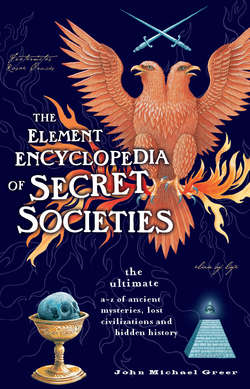Читать книгу The Element Encyclopedia of Secret Societies: The Ultimate A–Z of Ancient Mysteries, Lost Civilizations and Forgotten Wisdom - John Greer Michael - Страница 106
CHRISTIAN ORIGINS
ОглавлениеAs the largest religious movement in the modern world, and one of the most diverse and fractious religions in recorded history, Christianity has always had to deal with competing stories about its origins and early development. The question of Christian origins starts from the fact that for the first two centuries or so of its existence, the Christian movement was one of hundreds of tiny religious cults on the social fringes of the Roman world, and left very few traces of its existence. On the inkblot patterns of the handful of surviving sources, none of them impartial and many of them drastically edited later on, almost any set of claims can be projected.
According to the Roman Catholic and Eastern Orthodox churches, Christianity began with the career of Jesus of Nazareth, the son of the creator god of the universe, who transmitted a system of teachings, sacraments, and spiritual authority to a circle of followers before his death by crucifixion at the hands of the Roman colonial government of Judea. The books selected for inclusion in the New Testament all support this claim to one extent or another. See Jesus of Nazareth; Roman Catholic Church.
Other early Christian scriptures ex-cluded from the New Testament, many of them lost until twentieth-century archeological discoveries brought them to light again, challenge every aspect of the orthodox account but fail to establish any common ground among the alternatives. The wildly diverse Gnostic movement, which flourished from the first to the fourteenth centuries of the Common Era, presented dozens of interpretations of the nature of Jesus and the founding of Christianity. Early Jewish and Pagan sources, most of which survive only in fragments, suggest an alternative vision of Jesus of Nazareth as an itinerant wizard and folk healer on the fringes of Jewish society; while this interpretation is deeply disturbing to most Christians, it fits the evidence better than most other claims, including that of orthodoxy. See Gnosticism; Magic.
The last three centuries, however, have seen the greatest variety of alternative visions of Christian origins enter the field of debate. In the early eighteenth century, for example, French free-thinkers in a secret society titled the Chevaliers of Jubilation wrote and published one of the most scandalous books of the century, the Traité des Trois Imposteurs (Treatise on the Three Impostors), which claimed that Jesus of Nazareth was one of “three impostors” (the others being Moses and Muhammad) who manufactured fake religions and imposed them on credulous people. See Chevaliers of Jubilation.
It would take a volume larger than this one to describe all the accounts of Christian origins proposed during the nineteenth and twentieth centuries. Three in particular, however, require some discussion. The first of these emerged from the rebirth of Gnostic spirituality in the nineteenth century following the establishment of the Eglise Gnostique (Gnostic Church) by Jules Doinel in 1828. Doinel’s followers resurrected the old Gnostic teaching that Jesus had actually been a Gnostic but was redefined by the orthodox churches during the suppression of Gnosticism in the third and fourth centuries CE. By the early twentieth century this idea had become widespread, and came to focus on the revision of Jesus’ teaching by the apostle Paul, whose New Testament writings include most of the elements of Christian theology modern people find objectionable, and who many scholars believe played a central role in defining the version of Christian belief that ended up becoming the orthodox version of the faith.
